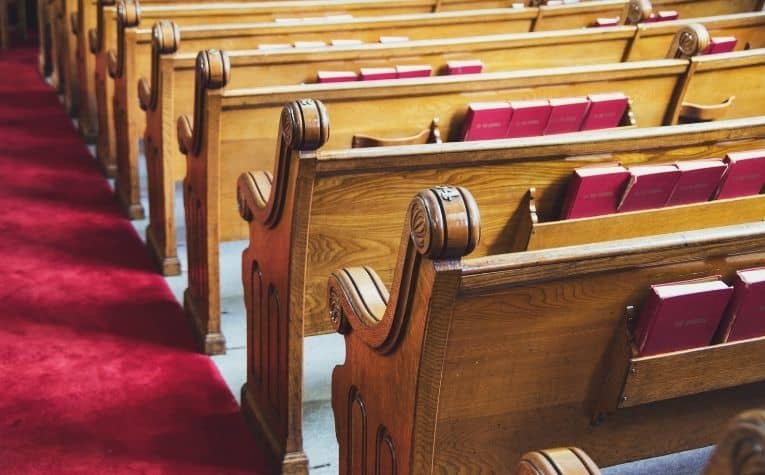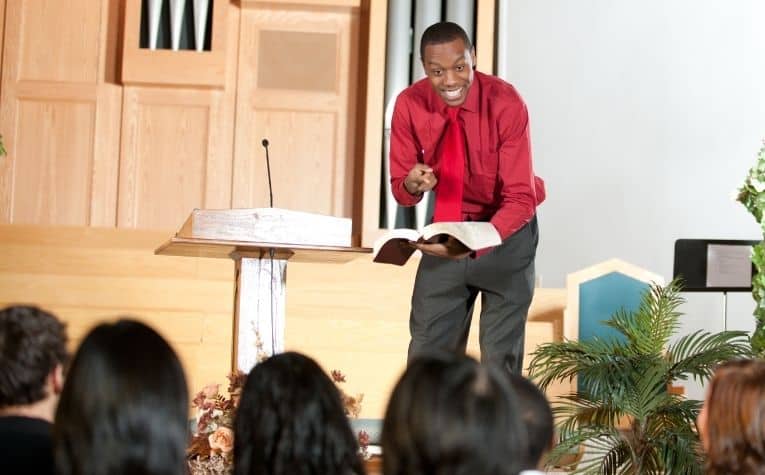Christianity is an important part of the American story in its various denominational expressions. Some denominations came to America from Europe, while others started on American soil. The size of a denomination doesn’t tell its whole story, but it does tell part of it.
Southern Baptist is the largest Protestant denomination in America, with 16 million members. The United Methodist Church is second with 7.6 million members. The National Baptist Convention is third with 5 million members. The Evangelical Lutheran Church in America is fourth with 4.1 million members.
The charts below list the 100 largest Christian denominations in America, from largest to smallest. The figures mostly come from denominational records and census surveys. Keep reading to learn more.
Also, see How to Choose A Denomination: The Ultimate Guide to learn more.

Historic Christian Branches by Size
Some consider Roman Catholicism, Protestantism, and Eastern Orthodoxy different religions, while others consider them different Christian denominations. (Also see Do All Denominations Go to Heaven?)
Membership numbers for these three traditional branches of the Christian faith are given first. The Top 100 Protestant denominations come next.
| Traditional Branch | Population in America |
|---|---|
| Roman Catholicism | 51 million |
| Protestantism | 141 million |
| Eastern Orthodox | 6 million |
Fifty-one million is the number of baptized members in America that the Roman Catholic Church reports. (Also see What Are the Different Catholic Denominations?)
Protestantism has no central ecclesiastical authority like Catholicism, so the number 141 million comes from the membership totals of all Protestant denominations put together. The Eastern Orthodox Church self-reports 6 million members in America. [1]
Largest Protestant denominations
Men like Martin Luther in Germany, John Calvin in France, and Ulrich Zwingli in Switzerland led the Protestant Reformation. As noted below, other Protestant denominations started in the 17, 18th, 19th, and 20th centuries in Europe and America. (Also see What Denominations are Calvinist?)
Four of the top 10 denominations are Baptist. The Baptist denomination has flourished in American history. Baptist traditions have grown in America due in part to overlapping values.
Baptists, like Americans, prize independence and individualism. Having a congregational church polity also mirrors American democracy for many people.
Three of the top 10 churches have roots in England. The United Methodist Church, the African Methodist Episcopal Church, and the Episcopal Church have roots in England, which partly explains why these denominations failed to grow as others did during the American Revolution. Nevertheless, the movement John Wesley began remains strong in the 21st century. (Also see What Denominations Are Arminian?)
Two of the top 10 denominations are Lutheran. Germany, the home of Martin Luther, was the epicenter of the Protestant Reformation. Germany’s influence in Europe and America in the last 500 years has contributed to the success of Lutheran branches of Protestant Christianity. German and European migration to America bolstered the Lutheran church.
Please note: In some cases, the founding date listed reflects the theological beliefs of each particular denomination, which some historians may question. A founding date may also reflect when a particular denomination split from its original tradition and became its own organization.
Also, see the Christian Denominations Comparison Chart to learn more.
| Rank | Protestant Denomination | Population/ Founding/ Churches |
|---|---|---|
| 1 | Southern Baptist Convention | 16 million 1845 45,800 |
| 2 | United Methodist Church | 7.6 million 1968 33,600 |
| 3 | National Baptist Convention, USA, Inc. | 5 million 1895 10,000 |
| 4 | Evangelical Lutheran Church in America | 4.1 million 1988 9,800 |
| 5 | Assemblies of God | 3.1 million 1914 12,900 |
| Rank | Protestant Denomination | Population/ Founding/ Churches |
|---|---|---|
| 6 | National Missionary Baptist Convention of America | 2.5 million 1988 1,300 |
| 7 | African Methodist Episcopal Church | 2.5 million 1814 7,000 |
| 8 | Baptist General Conference of Texas | 2.4 million 1848 5,300 |
| 9 | Lutheran Church-Missouri Synod | 2.2 million 1847 6,100 |
| 10 | Episcopal Church | 2 million 1789 6,800 |
The Assemblies of God denomination is perhaps the most surprising name in the Top 10 simply because of its age. At just over 100 years old, the Pentecostal, evangelical denomination is one of the fastest-growing Christian movements the world has ever seen.
While some Protestant denominations are experiencing record decreases in church membership and affiliation, Assemblies of God continues to grow at a steady rate. [2]
Also, see What Denominations Speak in Tongues? to learn more.

Largest Protestant denominations: 11-20
Baptist and Pentecostal traditions account for seven of the next ten denominations on this list.
Presbyterianism: Some Presbyterian denominations have experienced declines in recent decades, which some attribute to their embrace of progressive political and social ideologies.
Though lower in membership numbers, other Presbyterian denominations continue to hold firm to the teachings of founder John Calvin, the French Reformer. (Also see What Denominations Believe in Predestination?)
Seventh-Day Adventists: Many Protestant denominations began in Europe, such as Lutheran, Methodism, and Presbyterianism. The largest American-born denomination is the Assemblies of God, which traces its roots to Arkansas in the early 20th century. Seventh-Day Adventist Church started on American soil in upstate New York in the mid-19th century.
| Rank | Protestant Denomination | Population/ Founding/ Churches |
|---|---|---|
| 11 | Pentecostal Assemblies of the World | 1.8 million 1907 2,500 |
| 12 | Presbyterian Church (USA) | 1.7 million 1983 10,500 |
| 13 | Christian Churches and Churches of Christ | 1.4 million 1830s 5,500 |
| 14 | American Baptist Churches in the USA | 1.2 million 1814 5,400 |
| 15 | Church of God (Cleveland, Tennessee) | 1.1 million 1886 6,100 |
| 16 | Church of God in Christ | 1.1 million 1897 6,100 |
| 17 | Seventh-Day Adventists | 1.1 million 1863 5,800 |
| 18 | Armenian Apostolic Church, Diocese of America | 1,010,000 1887 108 parishes |
| 19 | Cooperative Baptist Fellowship | 1 million 1991 1,800 |
| 20 | Progressive National Baptist Convention, Inc. | 1 million 1961 1,500 |
Also, see What is the Largest Denomination in Each State? to learn more.
Largest Protestant denominations: 21-30
Reflecting America’s history of immigration, Christian denominations that include cultural traditions from a particular country appear below. Specifically, the Russian Orthodox Church and the Greek Orthodox Church are listed, like the Armenian Apostolic Church is on the table above.
Calvary Chapel: It’s important to note that although Calvary Chapel is Protestant in theology, its founders didn’t consider it a denomination.
Instead, Calvary Chapel churches prefer to be called an “association” of like-minded churches. Since this association meets the definition of a Christian denomination, generally speaking, they are on the list.
| Rank | Protestant Denomination | Population/ Founding/ Churches |
|---|---|---|
| 21 | United Church of Christ | 915,000 1957 5,000 |
| 22 | Church of the Nazarene | 906,000 1908 5,000 |
| 23 | Christian Church (Disciples of Christ) | 690,000 1849 3,700 |
| 24 | United Pentecostal Church International | 646,000 1945 4,300 |
| 25 | Eastern Rite Catholic, Uniate Churches | 500,000 no consensus unknown |
| 26 | Calvary Chapels | 500,000 1968 700 |
| 27 | Russian Orthodox Church Outside of Russia | 480,000 unknown 198 parishes |
| 28 | Greek Orthodox Archdiocese of North America | 476,878 1922 545 parishes |
| 29 | Full Gospel Fellowship of Churches and Ministers | 432,000 1962 684 |
| 30 | The Christian and Missionary Alliance (CMA) | 429,000 1887 2,000 |
Largest Protestant denominations: 31-40
One reason there are a lot of Christian denominations in America is that its laws espouse the freedom of religion for its citizens.
The Church and State are not intertwined in America as in many other countries, and the government largely stays out of ecclesiastical affairs. (Also see What Bible Translation Do Different Denominations Use?)
As a result of America’s religious freedom, people can start churches, and even denominations, without the threat of persecution or government interference.
Other countries have since established such freedoms, but in America, they have been cultural values since before the American Revolution in the 18th century.
Also, see What’s the Difference Between Methodist and Catholic? to learn more.
| Rank | Protestant Denomination | Population/ Founding/ Churches |
|---|---|---|
| 31 | The Salvation Army | 414,000 1880 1,200 |
| 32 | Wisconsin Evangelical Lutheran Synod | 385,000 1850 1,300 |
| 33 | Wesleyan Church | 385,000 1968 1,700 |
| 34 | Presbyterian Church in America | 370,000 1973 1,800 |
| 35 | Evangelical Free Church of America | 357,000 1950 1,400 |
| 36 | International Pentecostal Holiness Church | 330,000 1911 2,000 |
| 37 | African Methodist Episcopal Zion Church | 301,000 1821 1,600 |
| 38 | Lutheran Congregations in Mission for Christ | 300,000 2001 734 |
| 39 | Bible Way Church of Our Lord Jesus Christ | 300,000 1957 350 global |
| 40 | Coptic Orthodox Churches | 300,000 1st century 100 parishes |

Largest Protestant denominations: 41-50
The history of Christian denominations in America partly reflects the history of America itself. Some argue that the issue of slavery has shaped American history unlike any other national matter. Racial issues affect Christian churches before, during, and after the Civil War.
The Christian Methodist Episcopal Church listed below started in 1870 in Jackson, Tennessee. African-American Methodist ministers wanted to organize a church, including ordaining and electing their own leaders, without seeking white Methodist leaders’ approval.
In 2012, the C.M.E. denomination entered into “full union” with other historic African-American denominations as well as the United Methodist Church.
| Rank | Protestant Denomination | Population/ Founding/ Churches |
|---|---|---|
| 41 | Christian Methodist Episcopal Church | 291,000 1870 1,500 |
| 42 | Converge Worldwide (Baptist General Conference) | 260,000 1852 1,300 |
| 43 | International Church of the Foursquare Gospel | 255,000 1927 1,600 |
| 44 | National Baptist Convention of America, Inc. | 246,000 1895 575 |
| 45 | Reformed Church in America | 246,000 1792 886 |
| 46 | Christian Reformed Church in North America | 238,000 1857 1,100 |
| 47 | Church of God (Anderson, Indiana) | 233,000 1881 2,100 |
| 48 | Evangelical Covenant Church | 231,000 1885 839 |
| 49 | American Baptist Association | 203,000 1905 1,400 |
| 50 | Amish Churches | 200,000 1720s |
Largest Protestant denominations: 51-60
Amish churches trace their roots to 16th-century Europe and the Anabaptist movement, which didn’t consider itself Catholic or Protestant.
Persecuted in Europe, the descendants of the Amish community in America migrated to Pennsylvania in the 18th century. (Also see Evangelical vs. Non-Denominational: What’s the Difference?)
Largely separate from other Christian churches and society in general, Amish communities are found in Pennsylvania, Ohio, and elsewhere today.
| Rank | Protestant Denomination | Population/ Founding/ Churches |
|---|---|---|
| 51 | Conservative Baptist Association of America (CBA) | 200,000 1947 1,100 |
| 52 | Vineyard Churches International | 186,000 1983 545 |
| 53 | National Association of Free Will Baptists | 185,800 1935 2,400 |
| 54 | Evangelical Presbyterian Church | 150,000 1981 575 |
| 55 | North American Lutheran Church | 140,000 2010 400 |
| 56 | Baptist Missionary Association of America | 138,000 1950 1,200 |
| 57 | General Association of Regular Baptist Churches | 133,000 1932 1,300 |
| 58 | International Churches of Christ | 128,000 1979 667 |
| 59 | Christian Congregation, Inc. | 122,000 1887 1,500 |
| 60 | Church of the Brethren | 114,000 1708 967 |
Vineyard Churches International (see above) was originally part of the Calvary Chapel network of churches in southern California. In the early to mid-1970s, a group within Calvary Chapel churches desired to emphasize certain supernatural gifts of the Spirit, like speaking in tongues and exorcising demons.
The leaders of Calvary Chapel churches preferred the private exercise of such gifts, so the Vineyard group started their own church.
Also, see What’s the Difference Between Roman Catholic vs. Non-Denominational Churches?

Largest Protestant denominations: 61-70
The Messianic Jewish Alliance of America (see below) is one of several Messianic Jewish traditions in the United States. Members of this church believe that Jesus of Nazareth is the long-awaited Messiah spoken of in the Hebrew Scriptures, i.e., the Christian “Old Testament,” which makes them Christians. Yet they retain certain Jewish practices and traditions.
| Rank | Protestant Denomination | Population/ Founding/ Churches |
|---|---|---|
| 61 | Anglican Church in North America | 112,504 2009 983 |
| 62 | Baptist Bible Fellowship International | 110,000 1950 4,000 |
| 63 | Free Methodist Church of North America | 110,000 1860 900 |
| 64 | Mennonite Churches USA | 105,000 2001 920 |
| 65 | Orthodox Church in America (Russian Orthodox) | 100,000 1970 800 parishes |
| 66 | ECO: A Covenant Order of Evangelical Presbyterians | 100,000 2012 300 |
| 67 | Continuing Anglican Churches | 100,000 1977 1,000 parishes |
| 68 | Messianic Jewish Alliance of America | 100,000 1915 200 |
| 69 | Southwide Independent Baptist Fellowship | 100,000 1956 500 |
| 70 | Pentecostal Church of God | 98,600 1919 1,100 |
The Anglican tradition has been in America for centuries, so why was the Anglican Church in North America (see above) founded in 2009? In the early 21st century, many denominations formed because two groups split, unable to reconcile their differences.
From 2003 to 2009, Anglican denominations in America disagreed about the ordination of a gay bishop in New Hampshire. The Anglican Church in North America started as a result of that controversy and is made up of various Anglican groups that opposed the ordination.
Largest Protestant denominations: 71-80
All Baptists have common beliefs about practices like believers’ baptism, which holds that only professing Christians can be baptized, so not infants. Baptists also agree on the autonomy of local churches and the separation of Church and State. Baptists have diverse views on matters like salvation.
Some Baptists are Arminian, and others are Calvinists. The General Association of General Baptists (see below) is Arminian. Historically, Calvinist Baptists are often called “Particular Baptists.”
The word “particular” refers to Christ only dying for “particular” people (i.e., the doctrine of Limited Atonement) as opposed to all people.
| Rank | Protestant Denomination | Population/ Founding/ Churches |
|---|---|---|
| 71 | Church of God of Prophecy | 98,500 1923 1,700 |
| 72 | General Association of General Baptists | 95,000 1823 816 |
| 73 | Antiochian Orthodox Christian Archdiocese of North America | 75,000 1975 249 parishes |
| 74 | Cumberland Presbyterian Church | 71,000 1810 685 |
| 75 | Malankara Orthodox Syrian Church and Mar Thomas Orthodox Syrian Church | 70,000 1978 154 parishes |
| Rank | Protestant Denomination | Population/ Founding/ Churches |
|---|---|---|
| 76 | Serbian Orthodox Church in North and South America | 67,000 1921 68 parishes |
| 77 | North American Baptist Conference | 65,000 1865 410 |
| 78 | National Association of Congregational Churches | 63,000 1955 432 |
| 79 | IFCA International | 61,700 1930 659 |
| 80 | Grace Gospel Fellowship | 60,000 1945 113 |
Grace Gospel Fellowship (see above) is a cooperative fellowship of premillennial dispensational churches. Members hold to the central orthodox beliefs of the Christian faith and emphasize the doctrine of the end times. GGF doctrine states that God has different plans of salvation for Jews and Gentiles, which most premillennialists in other churches and denominations don’t believe.
Also, see What’s the Difference Presbyterian and Catholic? to learn more.
Largest Protestant denominations: 81-90
The Reformed Catholic Church (see below) has more liberal and progressive practices than the Roman Catholic Church. For example, it offers an open communion table to all people, including gay and lesbian attendees. The denomination denies the infallibility of the Pope as well.
| Rank | Protestant Denomination | Population/ Founding/ Churches |
|---|---|---|
| 81 | Reformed Catholic Church | 57,000 1988 100 parishes |
| 82 | Korean American Presbyterian Church | 55,000 1976 300 |
| 83 | National Primitive Baptist Convention, USA | 53,600 1907 547 |
| 84 | Primitive Baptists | 50,000 1827 1,600 |
| 85 | Transformation Ministries | 55,000 2006 170 |
| Rank | Protestant Denomination | Population/ Founding/ Churches |
|---|---|---|
| 86 | Ukrainian Orthodox Church of the USA | 50,000 1924 118 parishes |
| 87 | Conservative Congregational Christian Conference | 43,000 1948 316 |
| 88 | Church of the Living God (CWFF) | 42,000 1889 170 temples |
| 89 | Plymouth Brethren (Christian Brethren) | 42,500 1820s 860 |
| 90 | Association of Free Lutheran Congregations | 41,000 1962 273 |
The first bishop from the Ukraine Orthodox Church (see above) came to America in 1924. Today, the majority of this denomination’s members live in Pennsylvania and New York state.
Largest Protestant denominations: 91-100
The Friends United Meetings were organized in the early 20th century as a group of like-minded Quakers who sought fellowship and effectiveness in missions. Today, they have ministries all around the world.
| Rank | Protestant Denomination | Population/ Founding/ Churches |
|---|---|---|
| 91 | Albanian Orthodox Archdiocese in America | 40,000 1919 unknown |
| 92 | Hutterian Brethren | 40,000 1530 400 colonies |
| 93 | Church of God and Saints of Christ | 40,000 1896 2005 |
| 94 | Missionary Church | 38,200 1969 500 |
| 95 | Friends United Meeting | 36,000 1902 600 |
| Rank | Protestant Denomination | Population/ Founding/ Churches |
|---|---|---|
| 96 | US Mennonite Brethren Churches | 36,000 1878 200 |
| 97 | Apostolic Catholic Assyrian Church of the East, North American Diocese | 35,000 1st century 19 parishes |
| 98 | Friends General Conference | 35,000 1900 650 |
| 99 | Alliance of Baptist Churches | 35,000 1987 142 |
| 100 | Evangelical Friends Church, International | 34,500 1989 306 |
Also, see What’s the Difference Episcopalian and Baptist? to learn more.
Please see the related articles below.
References:
[1] Source
[2] Source
[3] Source
[4] Source
Related Articles
Catholic vs. Protestant vs. Orthodox: What's the Difference?
Roman Catholicism, Protestant Christianity, and the Eastern Orthodox Church are the three historical branches of the Christian religion. Each tradition traces its doctrines and practices to the New...
Pentecostalism vs. Charismatic Movement: What's the Difference?
Many people know that the terms "Pentecostal" and "charismatic" are associated with certain beliefs, churches, and people in modern Christianity but aren't sure how they compare. Although the terms...
